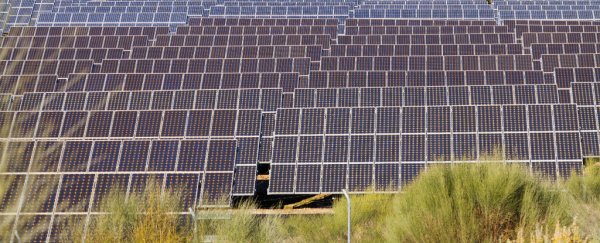India's prime minister has just announced the banding together of 121 of the world's warmest countries to invest in solar power technology and use it to connect the 1 billion people in the world who are living without electricity.
Detailed at the 2015 United Nations Climate Change Conference, which is currently underway in Paris, the announcement was made alongside reports of a new multi-billion-dollar African alliance to fund clean energy access across the continent, and a pledge from Dubai to generate 75 percent of its energy from renewable sources by 2050.
This comes just days after Bill Gates, Mark Zuckerberg, and a slew of powerful investors pledged billions towards the advancement of renewable energy, making it clear once and for all that fossil fuels are out, and sustainable energy is in.
"Solar technology is evolving, costs are coming down and grid connectivity is improving," India's prime minster Narendra Modi told the press. "The dream of universal access to clean energy is becoming more real. This will be the foundation of the new economy of the new century."
While most of the countries that have signed on to the new India-led International Agency for Solar Technologies and Applications (Iasta) are situated in the tropics, a number of European countries have also joined, including France, whose president said the idea was to use finances from the world's richest countries to bring energy to the world's poorest and most remote communities.
As Arthur Neslen reports for The Guardian, the Indian government will be forking out US$30 million to establish the alliance's headquarters in India, which will then focus on raising $400m to put towards renewables. India has also pledged to generate 40 percent of its electricity using renewable sources by 2030.
"The idea is that larger markets and bigger volumes will lead to lower costs, making it possible to spur demand," said India's senior negotiator, Ajay Mathur.
While this all sounds pretty great, the announcement has been criticised as not being nearly enough, particularly from what's set to be the world's most populous country - it's expected to have a population of 1.45 billion in the next 15 years.
According to Nelsen, Climate Action Tracker described India's pledge as "at the least ambitious end of what would be a fair contribution", while others have praised Modi for being so demonstrably pro-renewables.
Meanwhile, the African Union - an alliance of 54 countries - has launched the African Renewable Energy Initiative, which pledges to put $20 billion towards developing at least 10 gigawatts of renewable energy in the African continent in the next 10 years. Part of the funds for this initiative will be drawn from the $100 billion pledged by the world's rich countries by 2020 during the G-7 conference in June, and institutions such as the African Development Bank.
"The African Development Bank turned its focus to energy this year, seeking to bring electricity within a decade to the 620 million citizens on the continent who lack it," Anna Hirtenstein reports for Bloomberg Business. "The institution funds both conventional and renewable power plants, and said it will triple its financing of climate action projects to $5 billion annually by 2020."
Hirtenstein reports that the African Renewable Energy Initiative will likely focus on developing geothermal projects in East Africa's Rift Valley, wind power facilities in North Africa, and hydropower across the continent.
"We have the potential to deploy 11 terawatts of solar energy, 350 gigawatts of hydro, 110 gigawatts of wind and 15 gigawatts of geothermal," president of the African Development Bank, Akinwumi Adesina, said back in October.
Dubai also used the global stage in Paris to announce its new $27 billion project to equip every rooftop in the country with solar panels by 2030, The Guardian reports. It's part of Dubai's pledge to reach 25 percent renewables by 2030, and 75 percent renewables by 2050.
Will all these countries keep their promises? Hard to know, but we sure hope they do, or at least get close. But regardless of what ends up happening in the next few decades, there's no doubt that this marks the beginning of a new era when the world stopped ignoring the waning supplies of fossil fuels and looming effects of climate change. It's an exciting time to be alive.
